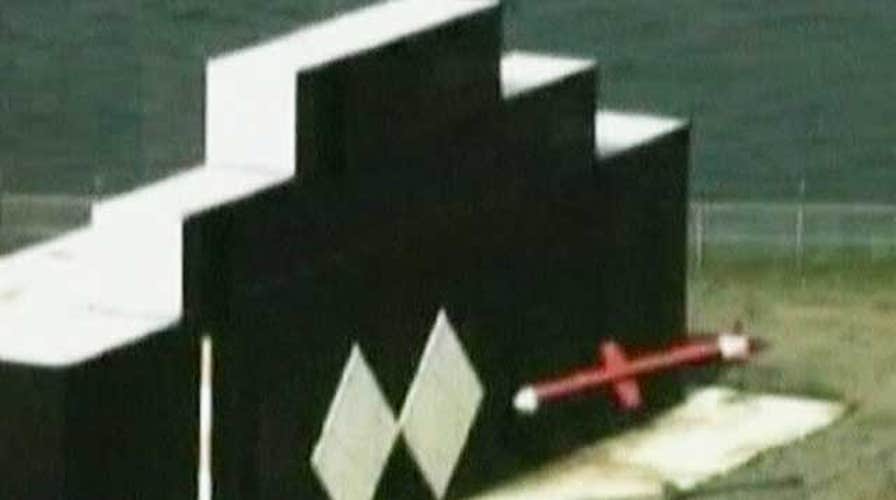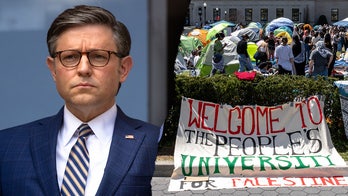As a nuclear North Korea proves once again that it's improving its technology and moving close to marrying a small nuclear device with a more powerful rocket, the United States' initial reaction Tuesday might have seemed unusual.
Asked Tuesday morning whether she expects a strong condemnation from the United Nations, U.S. Ambassador Susan Rice said: "We'll do the usual drill."
It was a surprising response to an international incident that was largely seen as a threat to the U.S. and one that prompted the U.N. Security Council to call an emergency meeting of world representatives.
"I don't know how you come up with a more dangerous scenario than this," Gordon Chang, author of "The Coming Collapse of China," said on Fox News. "This is a very bad dynamic for us."
Still, Rice and other U.S. officials had tough words later in the day.
After meeting with the Security Council, Rice described the test as "highly provocative" and "extremely regrettable."
"North Korea does not and will not benefit from violating international law," she said.
North Korea said it successfully detonated a miniaturized nuclear device at a northeastern test site Tuesday. South Korean, U.S. and Japanese seismic monitoring agencies said they detected an earthquake in North Korea with a magnitude between 4.9 and 5.2.
North Korea's official Korean Central News Agency said the test was conducted safely but with "great explosive power." The test counters the "ferocious" U.S. hostility that undermines the North's peaceful, sovereign right to launch satellites, it argued. Last month, North Korea's National Defense Commission said the U.S. was its prime target for a nuclear test and long-range rocket launches.
The development, along with the ongoing nuclear advancements in Iran and difficulty in bringing that regime to the negotiating table, pose a daunting challenge to John Kerry as he assumes his new duties as secretary of State.
President Obama promised international action to bring the rogue communist regime in line. The president also spoke with South Korea's president -- according to the White House, they pledged to work to "seek a range of measures aimed at impeding North Korea's nuclear and ballistic missile programs."
All 15 members of the United Nations Security Council sharply criticized North Korea's actions and motives Tuesday and said the test poses "a clear threat to international peace and security."
The council pointed out that in a resolution it approved unanimously last month stepping up sanctions for North Korea's missile test in December, it promised to take "significant action" in the event of a new nuclear test.
"In line with this commitment and the gravity of this violation, the members of the Security Council will begin work immediately on appropriate measures in a Security Council resolution," the council said in its statement.
Rice, after discussing the "usual drill," said further measures would be discussed and some nations would not only tighten existing measures but add additional sanctions. She also called the test "highly provocative."
The timing of North Korea's actions have been seen as significant. The test came hours before Obama is scheduled to give his State of the Union speech.
While Obama is expected to focus the bulk of his comments on the economy and job creation, Tommy Vietor, a spokesman for the White House's National Security Council, said the president would address North Korea's actions and would make the case that the nuclear program has only further isolated the impoverished nation.
"The president will say that the only way North Korea will rejoin the world community is if they stop these threats and live up to their international obligations," Vietor said.
Navigating the increasingly tense international waters will be up to Kerry. Rice, who was in the running for the job vacated by Hillary Clinton, withdrew her name for consideration in the wake of criticism over her comments after the Benghazi terror attack.
Kerry, who was approved by Congress to head up the State Department, displayed a familiarity with a broad range of issues during his confirmation hearings but it was unclear how he'd make headway on the nuclear issues with Iran and North Korea.
North Korea's detonation also comes four days before the birthday of Kim Jong Un's father, late leader Kim Jong Il, whose memory North Korean propaganda has repeatedly linked to the country's nuclear ambitions. This year also marks the 60th anniversary of the signing of the armistice that ended the 1950-53 Korean War.
The nuclear test is North Korea's first since Kim Jong Un took power of a country long estranged from the West.
Experts say regular tests are needed to perfect North Korea's goal of building nuclear warheads small enough to be placed on long-range missiles.
This atomic test is North Korea's third since 2006.
The test will likely be portrayed in North Korea as a strong move to defend the nation against foreign aggression, particularly from the U.S., North Korea's longtime enemy.
North Korea's rocket launches and nuclear tests largely are seen by analysts as threats designed to force the United States to confront the issue of military tensions between the foes 60 years after the end of the Korean War.
Following the announcement of the nuclear test, North Korean state television played a song with lyrics bragging that the country always carries out what it is determined to do. In the background were scenes of a North Korean long-range rocket blasting off and short-range missiles being fired into the sky.
Iran, which is in hot water with the U.N. over its own nuclear program, said Tuesday that they believe that all of the world's nuclear weapons should be destroyed.
"We think we need to come to a point where no country will have any nuclear weapons," Iranian Foreign Ministry Spokesman Ramin Mehmanparast said. He added that all countries should be able to use nuclear technology for "peaceful purposes."
The Associated Press contributed to this report.





